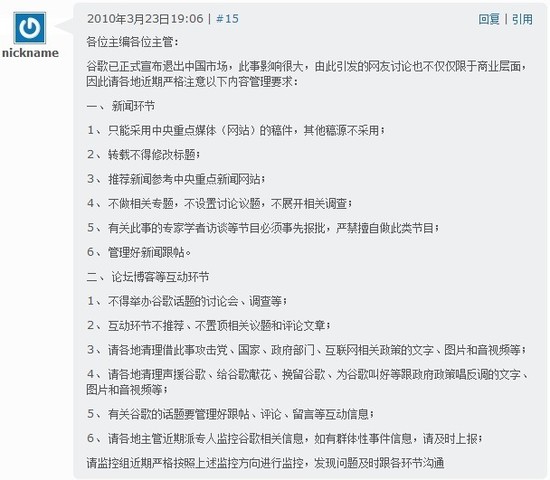In China, several political bodies are in charge of Internet content control. At the highest level, there is the Central Propaganda Department, which ensures that media and cultural content follows the official line as mandated by the CCP. Then there is the State Council Information Office (SCIO), which has established “Internet Affairs Bureau” to oversee all Websites that publish news, including the official sites of news organizations as well as independent sites that post news content.
This “Internet Affairs Bureau,” sent out very specific instructions to all large news websites daily, and often multiple times per day. Those instructions do not always mean that related contents are completely banned online, but they instruct websites to highlight or suppress certain type of opinions or information in a very detailed manner.
Chinese journalists and bloggers often refer to those instructions, as well as other type of censorship orders to media and websites, as “Directives from the Ministry of Truth.” The Ministry of Truth (or Minitrue, in Newspeak) is one of the four ministries that govern Oceania in George Orwell’s novel Nineteen Eighty-Four. In the Chinese blogosphere, it is the online lingo for the Central Propaganda Department and generally speaking, all other subordinate propaganda agencies including Internet supervision departments.
Today, it’s been said that news does not break, it tweets. For the officials in the the Ministry of Truth, the news is that their supposedly confidential instructions get tweeted as well. There are many Chinese journalists and online website editors who have twitter or sinaweibo (popular micro-blogging service of Sina) account. Often those censorship instructions are leaked into Chinese cyberspace from these insiders, through Twitter, Sinaweibo or other social networking services. In order to control this more interactive, fast-flowing information space, the “Ministry of Truth” is expanding: another “Internet Affairs Bureau 2” is being established under the State Council Information Office (SCIO), parallel to the current “Internet Affairs Bureau.” The mandate of the new bureau? Controlling social media and Web 2.0 services dominated by user-generated contents.
CDT translated the following contents, issued by the “Ministry of Truth” on March 23, 2010. These instructions are excerpts compiled from various sources:
All departments:
1, On the Neijiang-Suining (内江—遂宁) Highway construction site, a truck ran over and killed villagers. No reporting.
2, Some editors from Science Fiction World Magazine (《科幻世界》) published a public letter online. No reporting.
3. Google.cn switched its services from inland to Hong Kong, only use Xinhua general text, don’t play it up.Propaganda direction: Please every platform block the following information. 《Examining China》(《透视中国》); exposing five industry fields controlled by China’s princelings; Wen Jiabao’s solo “democracy” performance; at the crucial moment of the core power transition, political inner-circle releasing subtle messages; Beijing high officials’ “outrageous behaviors” during the “two sessions” causing many guesses.
Please execute.
Update: Additional reporting requirements have also been issued about Google’s decision to redirect its China-based search engine to Hong Kong:
All chief editors and managers:Google has officially announced its withdrawal from the China market. This is a high-impact incident. It has triggered netizens’ discussions which are not limited to a commercial level. Therefore please pay strict attention to the following content requirements during this period:
A. News Section
1. Only use Central Government main media (website) content; do not use content from other sources
2. Reposting must not change title
3. News recommendations should refer to Central government main media websites
4. Do not produce relevant topic pages; do not set discussion sessions; do not conduct related investigative reporting;
5. Online programs with experts and scholars on this matter must apply for permission ahead of time. This type of self-initiated program production is strictly forbidden.
6. Carefully manage the commentary posts under news items.B. Forums, blogs and other interactive media sections:
1. It is not permitted to hold discussions or investigations on the Google topic
2. Interactive sections do not recommend this topic, do not place this topic and related comments at the top
3. All websites please clean up text, images and sound and videos which attack the Party, State, government agencies, Internet policies with the excuse of this event.
4. All websites please clean up text, images and sound and videos which support Google, dedicate flowers to Google, ask Google to stay, cheer for Google and others have a different tune from government policy
5. On topics related to Google, carefully manage the information in exchanges, comments and other interactive sessions
6. Chief managers in different regions please assign specific manpower to monitor Google-related information; if there is information about mass incidents, please report it in a timely manner.We ask the Monitoring and Control Group to immediately follow up monitoring and control actions along the above directions; once any problems are discovered, please communicate with respected sessions in a timely manner.
Addition guidelines:
– Do not participate in and report Google’s information/press releases
– Do not report about Google exerting pressure on our country via people or events
– Related reports need to put [our story/perspective/information] in the center, do not provide materials for Google to attack relavent policies of our country
– Use talking points about Google withdrawing from China published by relevant departments
See also a post from ChinaGeeks which translates a phone call from a Hong Kong reporter to government officials trying to confirm Google’s actions.








